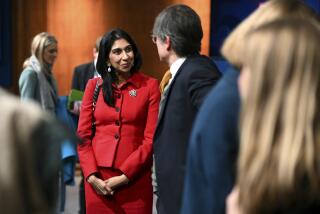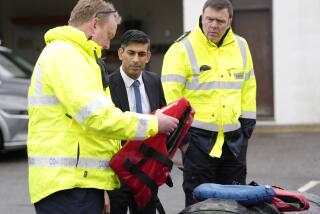10 Extremists Arrested in British Crackdown
- Share via
LONDON — Britain launched a crackdown on foreign-born Muslim ideologues Thursday, arresting 10 of them and announcing they would be deported for posing a threat to national security.
Home Secretary Charles Clarke announced the detentions five weeks after four bombers killed 52 people and themselves in the London transit system and three weeks after an attempted follow-up attack. The second attack caused no casualties but raised fears of a full-fledged terrorist campaign against Britain.
Clarke did not identify the detainees or say where they would be sent. But lawyers said that among them was Palestinian Jordanian preacher Abu Qatada, 44. Investigators say Abu Qatada’s fiery sermons have inspired radicals across Europe and in the Middle East, and videos of the cleric were found in the flat in Hamburg, Germany, used by Mohamed Atta, a Sept. 11 plotter and hijacker.
The government moved less than a week after Prime Minister Tony Blair announced tough anti-terrorism measures, including shutting down radical mosques and deporting clerics accused of preaching violence and hate, who had previously spoken and acted under the protection of Britain’s strong human rights laws.
“In accordance with my powers to deport individuals whose presence in the U.K. is not conducive to the public good for reasons of national security, the immigration service has today detained 10 foreign nationals who I believe pose a threat,” Clarke said.
Over the last decade, London became a hub of extremist networks, angering other countries and earning the sardonic nickname “Londonistan.” Last month’s attacks here were carried out largely by Muslims born or raised in Britain, increasing worries that prominent clerics played a role in pushing British militants into violence at home.
Abu Qatada entered Britain on a forged United Arab Emirates passport in 1993 and was granted asylum. Investigators have linked him to terrorist cells and plots in countries including Spain, France, Italy, Belgium and Jordan.
He also has been linked to shoe bomber Richard C. Reid and Zacarias Moussaoui, who pleaded guilty in April to charges connected to the Sept. 11 plot. And investigators say the cleric’s teachings have had a profound influence on front-line fighters such as Abu Musab Zarqawi, the leader of an Al Qaeda-affiliated group in Iraq.
Abu Qatada, whose real name is Omar Mahmoud Othman, is a Palestinian who carries a Jordanian passport. He has been convicted twice in absentia in Jordan, including on charges of conspiring to attack U.S. and Israeli tourists during millennium celebrations at the end of 1999.
He also has been indicted by Spanish authorities in connection with the Sept. 11 attacks and last year’s train bombings that killed 191 people in Madrid. In requesting the cleric’s extradition, Spanish Judge Baltasar Garzon described him as Al Qaeda leader Osama bin Laden’s “spiritual ambassador to Europe.”
In a previous CNN interview, Abu Qatada denied ever meeting Bin Laden. His seeming impunity has angered many British leaders and citizens because he and other militants receive subsidized housing and welfare benefits from a country they often denounce.
Another well-known British-based radical, Omar Bakri Mohammed, was arrested Thursday in Lebanon. Bakri, who has lived in Britain for 20 years, had left Saturday to visit his mother. British officials said that they had not issued a warrant for Bakri and that they were not involved in his arrest.
A third radical, Abu Hamza al Masri, faces charges in Britain of incitement to kill Jews and other non-Muslims. In addition, the United States is seeking his extradition in connection with a plan to establish terrorist training camps in Oregon.
British and European anti-terrorism officials have said that, besides human rights concerns, the official tolerance enjoyed by Abu Qatada and others resulted from a strategic decision by British spymasters who thought that allowing ideologues to operate openly made it easier to gather intelligence. Some of the radicals have claimed that they acted as double agents, spouting heated rhetoric but also keeping British security services informed about potential threats.
Although it was unclear where Abu Qatada would be sent, the arrests were made one day after Britain made a deal with Jordan that deportees returned there would not be tortured or executed, removing a key obstacle to sending suspects there.
Even so, the arrests were sharply criticized by human rights activists and lawyers who feared that the government’s tough new line threatened Britain’s traditional respect for civil liberties.
Louise Christian, a leading human rights lawyer who represented some British detainees at the U.S. military prison at Guantanamo Bay, Cuba, said Britain shouldn’t trust Jordan not to torture detainees.
“It’s well documented that countries that are known to use torture often deny torturing anyone,” she said. “So those agreements are not worth the paper they’re written on.”
The Home Office, however, wants similar deals with nine other countries and says Blair had “constructive conversations” last week with Algeria and Lebanon.
The other nine detainees were seized in London, Luton, Leicestershire and the West Midlands, areas where Britain’s estimated 1.6 million Muslims are concentrated. British media reported that they included at least two others from a group of 12 foreign nationals who, like Abu Qatada, were first arrested under emergency anti-terrorism legislation introduced in the wake of the Sept. 11 attacks.
Charges were never filed against the 12, whom the government identified only by letters of the alphabet, or Abu Qatada. They could not be deported because Britain’s 1998 Human Rights Act bans the government from deporting anyone to a country where they might suffer torture or the death penalty.
Instead, the government detained them without trial at the Belmarsh high-security prison in southeast London, riding out a storm of protest that the detainees’ rights were being violated. Some critics asserted that Belmarsh had become “our Guantanamo.”
Abu Qatada and several others were detained for as long as three years before Britain’s most senior lawyers, the Law Lords, ordered their release in March after the law under which they had been arrested was ruled illegal.
Rather than freeing the prisoners, the government put them under a restrictive new form of house arrest known as a “control order.” They have lived at home since then under strict curfew and wearing electronic tags; they have been denied access to the Internet and forbidden to preach in mosques.
The Home Office said in June that 11 men were living under control orders. Abu Qatada was one of two Jordanians, the other being Mahmoud Suliman Ahmed Abu Rideh. The remaining nine are from Algeria, Tunisia and Libya.
Two, identified only as “Q” and “I,” are widely reported to be among Thursday’s detainees. “I,” an Algerian, claimed asylum in Britain in 1995 and was detained in 2002, accused of raising funds for terrorist groups.
Lawyers say the first step in the deportation process is a hearing by the Special Immigration Appeals Commission, which will not necessarily be presented all the evidence. Appeals could cause the process to go on for several months.
Gareth Peirce, a lawyer for Abu Qatada and several other former Belmarsh detainees who have been rearrested, said the government’s actions Thursday were “dangerous and insane government at its worst.”
Christian, the human rights lawyer, added: “Not only were these people arrested early in the morning, but their solicitors were not contacted and can’t even find out where they are. Some have been detained without trial for up to three years already and only released into house arrest.
“Many have mental health problems too. Yet they’ve disappeared into Home Office limbo and are being held incommunicado, which I think is an absolute disgrace.”
The government defended its actions.
“The circumstances of our national security have changed,” Clarke said. “It is vital that we act against those who threaten it.”
Rotella is a Times staff writer and McWalters is a special correspondent.
More to Read
Sign up for Essential California
The most important California stories and recommendations in your inbox every morning.
You may occasionally receive promotional content from the Los Angeles Times.










